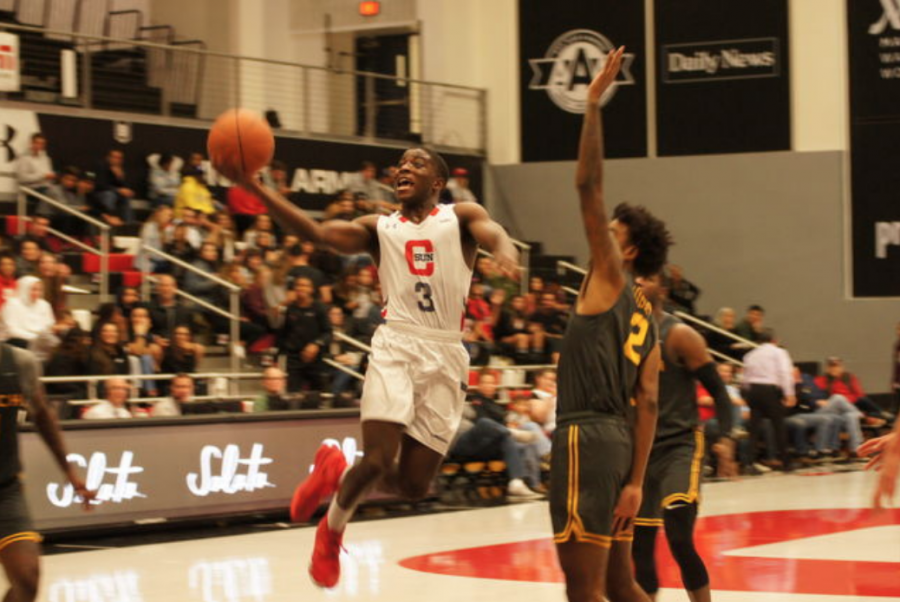NCAA releases health and safety guidelines for basketball
NCAA released COVID-19 safety guidelines for collegiate basketball. The 2020-2021 women’s and men’s basketball season will start on Nov. 25.
October 2, 2020
The NCAA Sport Science Institute, in partnership with the NCAA COVID-19 Medical Advisory Group, has released its COVID-19 guidelines for collegiate basketball.
The guidelines feature updated protocols for testing, travel, practice, games and what to do in the event of a positive test result or exposure to the virus. They have also been supported by the NCAA board of governors, according to a press release by the NCAA.
“This basketball resocialization guidance is based on the best information available in a rapidly changing COVID-19 environment,” NCAA President Mark Emmert said in the press release. “It is predicated on the assumption that rapid testing capabilities will be readily available later this year. We will constantly assess emerging information as we prepare for the start of the basketball season at the end of November.”
The guidelines call for college athletes and athletic personnel who interact with the athletes to be vigilant and take the proper precautions at all times, especially when away from athletics.
They also encourage schools to define “Tier 1 individuals,” which refers to college athletes and essential basketball personnel whose job function requires direct access to players on a regular basis, specifically close contact — six feet or less — for 15 minutes or more. These individuals are considered to be at a higher risk of becoming infected if any other person in the group is contagious.
It is recommended that schools test at least three times per week on non-consecutive days during the regular and postseason for all people considered to be Tier 1 individuals, including the officials.
For the preseason and practice, testing should be done weekly as long as there are no scrimmages with outside competition.
People at the bench area are not expected to wear masks and social distance because it is assumed they are Tier 1 individuals who are being tested frequently. However, they do suggest the bench be physically separated from all people who are not considered Tier 1.
Regarding travel, teams should consider protocols that maximize the opportunity for physical distancing and call for universal masking for all individuals traveling.
They also recommend prepackaged meals, room service, takeout and outdoor dining options as alternatives to inside restaurant dining.
It is also suggested that teams should restrict travel party sizes as much as possible — ideally not greater than 30 individuals — and traveling to and from the game on game days to avoid overnight stays.
Schools should also have a plan in place if a person becomes symptomatic after departure, which includes confirming ahead of time whether the host schools have adequate testing capabilities and health care resources.
If any Tier 1 individual becomes infected, schools should consider quarantining the entire team, including coaching staff and other essential personnel who are part of Tier 1, for 14 days. However, determinations around who must be quarantined are ultimately the jurisdiction of applicable public health officials.
“The guidelines reflect recommendations from collaboration with the NCAA COVID-19 Medical Advisory Group, which features representatives from across the membership,” NCAA Chief Medical Officer Brian Hainline said in the press release. “We will continue to work with them and others from the Association in safeguarding student-athlete well-being.”
The NCAA COVID-19 Medical Advisory Group includes team physicians, infectious disease and public policy experts, representatives from the membership and representatives from the NCAA COVID-19 Advisory Panel, National Athletic Trainers’ Association, American Medical Society for Sports Medicine, National Medical Association, Autonomy 5 Medical Advisory Group and NCAA Committee on Competitive Safeguards and Medical Aspects of Sports, according to the press release.
The NCAA also has a hotline for people to report potential concerns regarding the protocols. They can be reached at 833-661-2819 or covidconcerns@ncaa.org; the name of the NCAA member institution, sport and a brief summary of the concern has to be included.
